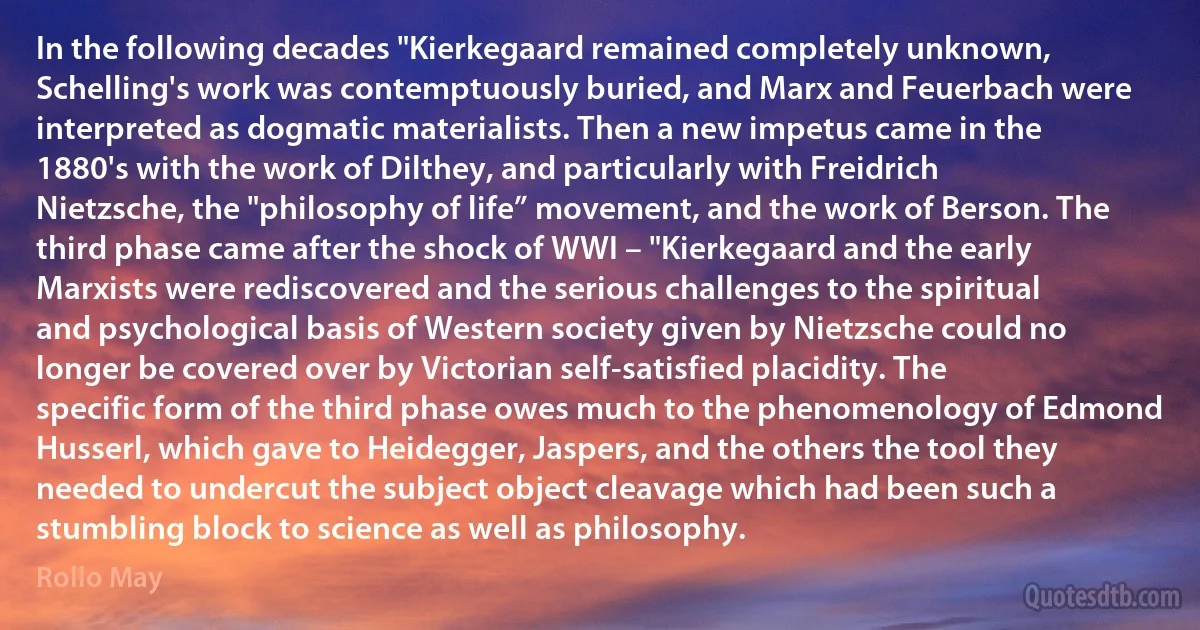
In the following decades "Kierkegaard remained completely unknown, Schelling's work was contemptuously buried, and Marx and Feuerbach were interpreted as dogmatic materialists. Then a new impetus came in the 1880's with the work of Dilthey, and particularly with Freidrich Nietzsche, the "philosophy of life” movement, and the work of Berson. The third phase came after the shock of WWI – "Kierkegaard and the early Marxists were rediscovered and the serious challenges to the spiritual and psychological basis of Western society given by Nietzsche could no longer be covered over by Victorian self-satisfied placidity. The specific form of the third phase owes much to the phenomenology of Edmond Husserl, which gave to Heidegger, Jaspers, and the others the tool they needed to undercut the subject object cleavage which had been such a stumbling block to science as well as philosophy.
Rollo MayRelated topics
block bury came cleavage early following form given impetus life longer phenomenology science specific third undercut unknown victorian well western work others Marx Kierkegaard Heidegger Nietzsche owesRelated quotes
Part of the unknown reality, then, is hidden beneath language and the enforced pattern of accustomed words-so, for an exercise, look about your environment. Make up new, different 'words' for the objects that you see about you. Pick up any object, for example. Hold it for a few seconds, feel its texture, look at its color, and spontaneously give it a new name by uttering the sounds that come into your mind. See how the sounds bring out certain aspects of the object that you may not have noticed before. The new word will fit as much as the old one did. It may, in fact, fit better. Do this with many objects, following the same procedure. You can instead say the name of any object backwards. In such ways you break up to some extent the automatic patterning of familiar phrases, so that you can perceive the individuality that is within each object.

Robert Butts
The chief distinction in the intellectual powers of the two sexes is shewn by man attaining to a higher eminence, in whatever he takes up, than woman can attain - whether requiring deep thought, reason, or imagination, or merely the use of the senses and hands. If two lists were made of the most eminent men and women in poetry, painting, sculpture, music, - comprising composition and performance, history, science, and philosophy, with half-a-dozen names under each subject, the two lists would not bear comparison. We may also infer, from the law of the deviation of averages, so well illustrated by Mr. Galton, in his work on 'Hereditary Genius,' that if men are capable of decided eminence over women in many subjects, the average standard of mental power in man must be above that of woman. ... Thus man has ultimately become superior to woman.

Charles Darwin
It is true that God is necessity, or, as we may also put it, that he is the absolute Thing: he is however no less the absolute Person. That he is the absolute Person however is a point which the philosophy of Spinoza never reached: and on that side it falls short of the true notion of God which forms the content of religious consciousness in Christianity. Spinoza was by descent a Jew; and it is upon the whole the Oriental way of seeing things, according to which the nature of the finite world seems frail and transient, that has found its intellectual expression in his system. This Oriental view of the unity of substance certainly gives the basis for all real further development. Still it is not the final idea. It is marked by the absence of the principle of the Western world, the principle of individuality, which first appeared under a philosophic shape, contemporaneously with Spinoza, in the Monadology of Leibnitz.

Baruch Spinoza
With the advent of medieval Scholasticism, ... we find a clear distinction between theologia and philosophia. Theology became conscious of its autonomy qua supreme science, which philosophy was emptied of its spiritual exercises, which, from now on, were relegated to Christian mysticism and ethics. Reduced to the rank of a "handmaid of theology,” philosophy's role was henceforth to furnish theology with conceptual-and hence purely theoretical-material. When, in the modern age, philosophy regained its autonomy, it still retained many features inherited from this medieval conception. In particular, it maintained its purely theoretical character, which even evolved in the direction of a more and more thorough systemization. Not until Nietzsche, Bergson, and existentialism does philosophy consciously return to being a concrete attitude, a way of life and of seeing the world.

Pierre Hadot
The most immediate result of this unbalanced specialisation has been that to-day, when there are more "scientists" than ever, there are much less "cultured" men than, for example, about 1750. And the worst is that with these turnspits of science not even the real progress of science itself is assured. For science needs from time to time, as a necessary regulator of its own advance, a labour of reconstitution, and, as I have said, this demands an effort towards unification, which grows more and more difficult, involving, as it does, ever-vaster regions of the world of knowledge. Newton was able to found his system of physics without knowing much philosophy, but Einstein needed to saturate himself with Kant and Mach before he could reach his own keen synthesis. Kant and Mach - the names are mere symbols of the enormous mass of philosophic and psychological thought which has influenced Einstein.

José Ortega y Gasset
